Magnolia: The Drunken Commentary Track
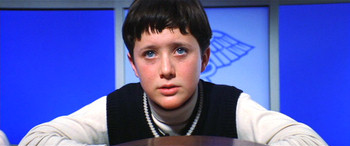 This is what customer service is all about. Seven hours after voting closed in a poll for the next installment, we’ve published the Drunken Commentary Track for Paul Thomas Anderson’s Magnolia – and the movie’s three hours long.
This is what customer service is all about. Seven hours after voting closed in a poll for the next installment, we’ve published the Drunken Commentary Track for Paul Thomas Anderson’s Magnolia – and the movie’s three hours long.

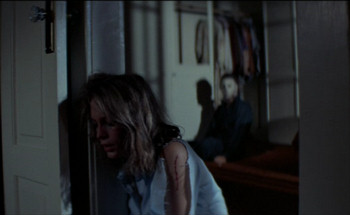 With Rob Zombie’s remake in theaters this weekend, I thought it would be a good opportunity to explore why Michael Myers (or “The Shape”) worked so well in John Carpenter’s 1978 movie Halloween.
With Rob Zombie’s remake in theaters this weekend, I thought it would be a good opportunity to explore why Michael Myers (or “The Shape”) worked so well in John Carpenter’s 1978 movie Halloween.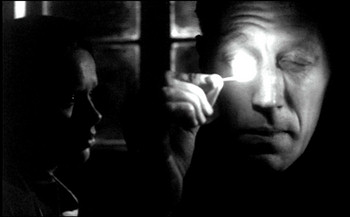 The deaths last week of movie writers and directors Ingmar Bergman and Michelangelo Antonioni have incited
The deaths last week of movie writers and directors Ingmar Bergman and Michelangelo Antonioni have incited 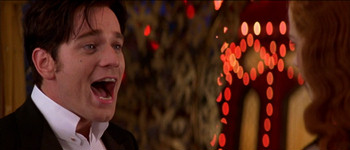 I’ll keep this brief: If you’ve seen it, chances are excellent that you either love or loathe Moulin Rouge. But have you ever spent the time to really figure out why? In this Drunken Commentary Track, Culture Snob and
I’ll keep this brief: If you’ve seen it, chances are excellent that you either love or loathe Moulin Rouge. But have you ever spent the time to really figure out why? In this Drunken Commentary Track, Culture Snob and 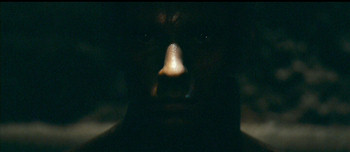 The contradictions of director/co-writer/composer Tom Tykwer’s Perfume: The Story of a Murderer start in the title, with the onomatopoeic softness and ether of a single word paired with a morbid, blunt descriptive subtitle. Both components are drawn from the novel by Patrick Süskind, but the associations that pile up and pull at each other during the movie’s opening scenes are equally Tykwer’s, cinematic and lovingly ambiguous.
The contradictions of director/co-writer/composer Tom Tykwer’s Perfume: The Story of a Murderer start in the title, with the onomatopoeic softness and ether of a single word paired with a morbid, blunt descriptive subtitle. Both components are drawn from the novel by Patrick Süskind, but the associations that pile up and pull at each other during the movie’s opening scenes are equally Tykwer’s, cinematic and lovingly ambiguous. Have you calmed down yet? Are you over the orgasmic delight you felt at the way David Chase defied all predictions about the end of his beloved series, The Sopranos? Have you recovered from your rage about ambiguity, a lack of closure, and Journey? Good. Now let’s clear a few things up.
Have you calmed down yet? Are you over the orgasmic delight you felt at the way David Chase defied all predictions about the end of his beloved series, The Sopranos? Have you recovered from your rage about ambiguity, a lack of closure, and Journey? Good. Now let’s clear a few things up. In honor of the final episode of The Sopranos, Culture Snob takes a look at five minutes from The Wire – a show that probably wouldn’t exist were it not for that crime family from Jersey. This brief audio commentary – part of the “Five Minutes” series – looks at one scene from The Wire’s first season. In these five minutes, the only dialogue that passes between Baltimore Police detectives Bunk and McNulty are variations on the word “fuck” and one utterance of “pow,” but the audience pieces together how this particular murder went down through visual storytelling and acting devoid of meaningful words.
In honor of the final episode of The Sopranos, Culture Snob takes a look at five minutes from The Wire – a show that probably wouldn’t exist were it not for that crime family from Jersey. This brief audio commentary – part of the “Five Minutes” series – looks at one scene from The Wire’s first season. In these five minutes, the only dialogue that passes between Baltimore Police detectives Bunk and McNulty are variations on the word “fuck” and one utterance of “pow,” but the audience pieces together how this particular murder went down through visual storytelling and acting devoid of meaningful words.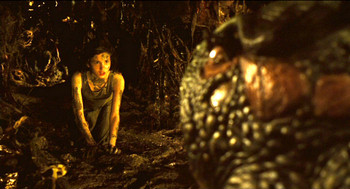 In a
In a  When we say that a movie is more style than substance, we typically mean it derisively. Oliver Stone’s JFK has a ton of stuff – with the director’s cut running nearly three and a half hours – that was mistaken for its substance. But the meat of the movie is its style, because it’s the fuel that made the film so combustible.
When we say that a movie is more style than substance, we typically mean it derisively. Oliver Stone’s JFK has a ton of stuff – with the director’s cut running nearly three and a half hours – that was mistaken for its substance. But the meat of the movie is its style, because it’s the fuel that made the film so combustible. There’s a maxim that says a movie teaches you how to watch it, but Peter Weir’s The Truman Show teaches you how to watch it the wrong way. And in its brazen audience cues, it hints that you should question your reaction to the film. This is a movie that was made for misunderstanding.
There’s a maxim that says a movie teaches you how to watch it, but Peter Weir’s The Truman Show teaches you how to watch it the wrong way. And in its brazen audience cues, it hints that you should question your reaction to the film. This is a movie that was made for misunderstanding.